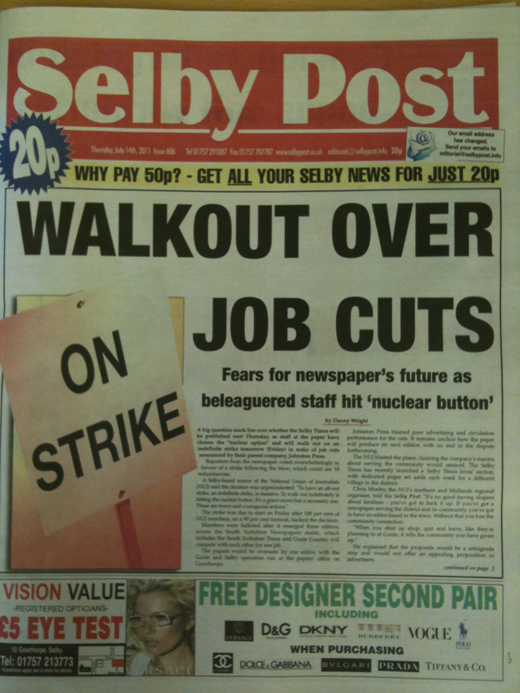
Johnston Press journalists picket the offices of the South Yorkshire Times
Johnston Press in South Yorkshire are out on indefinite strike over planned redundancies at five titles in the region. (See more from Journalism.co.uk about the strike action at this link).
Management have come in for a lot of flak from the unions over their handling of the strike, which included asking a 16-year-old schoolboy on work experience to stay on an extra week and help cover the newsdesk.
Further embarrassment for the company comes in the form of Tom Bills and friend Jack Reed. Tom – the son of Johnston Press managing director John Bills – and Jack were drafted in to help out on the newsdesk of the Doncaster Free Press, according to NUJ deputy organiser for the region Lawrence Shaw, despite having no journalistic experience.
But rather than hide their faces away like strike breakers might normally do, ferried through a picket line on a bus with wire mesh on the windows, Tom and Jack publicised their newsroom antics on Facebook, for the world to see.
Shaw spotted the Facebook status updates and reposted them on his blog.
They include such gems from Tom as:
workin in a newsroom in doncaster, av been for a couple of weeks! Its reaaaaalllly goood!:) x
is it bad that I found the word ‘erection’ funny at work in a story about a building being built?!!:)
sooooo bored at work I’ve actually started look at the clock more than my computer screen.
Bored, but managing to get though it:
just thinkin of the dollar atm!
As, I’m sure, are the journalists out on strike with no pay.
And from Tom’s equally eloquent friend Jack:
nothing get a man erect like doncaster editorial. lets toss each other off.
And:
can u listen to ur ipod in a newsroom wen ur sposed to be workin?
Humorous yes, but as Shaw points out, the move raises questions about John Bills’ judgement:
Why did he employ his own son and his friend to work in editorial when neither appear to have any journalistic training or experience, then allow them to sarcastically spout forth on facebook belittling the newspapers he runs? It reinforces the belief held by the NUJ that John Bills cares not a jot about the editorial coverage in the newspaper, or even the reputation of the papers.
Had any ordinary NUJ member been caught mouthing off on facebook in the same way, they would have almost certainly been sacked for bringing the company into disrepute. So seeing as John Bills is ultimately responsible for employing his son to sit in the office and mouth off about how crap it is working at the Doncaster Free Press, surely Johnston Press directors should be seriously questioning his suitability for running a newspaper group.



